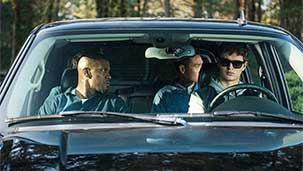Baby Driver is a close-to-perfect example of a genre exercise. It’s so intricately constructed and executed, so seamlessly plotted and scored that it almost obscures the fact that it’s a film that’s utterly and completely empty of any kind of emotional calories. A seven course meal consisting entirely of different coloured cotton candy.
Make no mistake though, this is some friggin’ delicious cotton candy.
With Baby Driver you’ve reached an apex of sorts. All of your previous films, from Shaun of the Dead through Scott Pilgrim vs the World and The World’s End, while unquestionably clever and engaging, were also uneven and overlong. Baby Driver, on the other hand, is a flawless distillation of those previous works, without any of the impurities.
Baby Driver’s plotting is lean and intricate. The setting where you place Baby (the film’s titular protagonist, played with a latter-day-Michael-Cera-like-intensity by Ansel Elgort) is both familiar and exotic. It is a world populated by character’s limned in thick black ink lines and composed entirely of easily identifiable tropes. Baby Driver is what would happen if you put Reservoir Dogs, Pulp Fiction and True Romance in a blender and turned it on high. Depending on your nutritional requirements and preferences that results in either a delicious smoothie, or something that tastes like nothing in particular.
Movies about movies—where fundamental aspects of the film’s grammar require the audience to refer to previous works—are a dead end creatively. Even in a master technician’s hand they become so recursive that the only avenue left to them is one that goes exactly nowhere. And as more and more film maker’s build upon that established template the films themselves become pastiches of pastiches—like a third generation cover of The Knack’s My Sharona.
This is coming off maybe harsher than I intended. I like your work and have watched every one of your films more than once. I also really admired how well executed Baby Driver was. From the non CGI laden driving sequences to the sharp, well delivered dialogue, solid performances (Jon Bernthal and Kevin Spacey specifically—both in supporting roles) and the clever integration of the soundtrack into the story, there a lot about this film that I admire.
For me though, especially so soon after experiencing a genre bending, small masterpiece like It Comes At Night, watching your film reminded of why I’m so put off of Tarantino (and his adherents) these days. There is an underlying smugness, a nod and glance to the film literati, that suffuses the whole film. As a result, Baby Driver ends up feeling vaguely exclusionary and somehow mean spirited. All the cleverness and fan service is too front and center, as if that is the point, instead of a nice add on. Contrast that with the kind of gut wrenching and deeply intimate undercurrent of It Comes At Night, which, while playing with genre conventions and audience expectations, has at its core something to say. Or, at least, an honest attempt to add something meaningful to the cultural conversation.
I won’t remember a moment of Baby Driver a week from now. Mostly because every emotional beat in the film is a third order recapitulation of a scene from some other film. Leaving the theatre I was left with the impression I had just watched a supremely well executed long form ad for Subaru, inasmuch as all the characters are is just that—characters in a film. I guess I’ve lost the taste for watching archetypes expertly moved around a chess board to no other end than demonstrating how adroitly they can be manipulated.
Sincerely,

Tim







